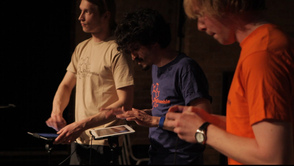 September, 2013 If you’ve read the first two parts of this post, you may have the mistaken impression that I’m a technophobe. It would be silly to be “against technology.” Since the cave days, man has innovatively employed techniques to accomplish his tasks. Using utensils for eating, maps for finding one’s way, or traps for catching food are all uses of technology. My beef is not with technology (“smart” gadgets in this case) per se. I’m simply appealing for smart choices, i.e. to consider the often overlooked impacts of these gadgets, their costs, and to control our voracious appetites for them. They easily become distractions from life’s deepest needs rather than the answer. Most importantly, smart gadgets should not be our masters. It would be equally foolish to overlook the obvious benefits of devices like cell phones with GPS, cameras, and certain app’s. They offer convenience and time savings. They offer obvious advantages in emergencies (e.g. when trapped in a vehicle or under rubble with your cell), serve to stop crime, and serve as public surveillance. If those were their primary use – to improve healthcare and public safety – I’d be right there with the rest of the world toasting the smart gadget revolution. But I seriously doubt this noble purpose (health and safety) was prominent on Steve Jobs’ radar, or that this is the primary reason people own them. So, my question is at what cost do we gain the convenience of these smart devices? And my assertion has been that the losses might well prove to outweigh the gains. As I’ve already tried to argue, smart technology has already exacted a cost beyond what we can afford – socially, emotionally, physically, and relationally. We have made serious compromises to the quality of communication and our relationships, to personal growth, and to our children’s physical development. Smart technology threatens to make us dumber in these fundamental facets of our humanity. The ultimate price is a spiritual one. First, as just suggested, smart devices encourage a reductionist version of what it means to be humans created in the image of God. The term “smart technology” betrays a common misconception: that intelligence is primarily or only about obtaining and retaining as much information as possible. Indeed, science has long recognized memory as one kind of intelligence. But to reduce intelligence to such a narrow definition ignores kinds of human intelligence such as critical thought, value judgements, social and emotional intelligence, creative intelligence, spatial intelligence, and physical intelligence, to name a few, i.e. the kinds of intelligence that make us uniquely human. Without them our masses of information are meaningless. Next, we need to dispense with the mistaken notion that smart technology sets us free. Go back to the college girl standing in the hall, who was so immersed in her texting that she couldn’t notice her fellow classmate trying to get her attention. I mean “couldn’t” not simply “didn’t want to.” Like so many others, she has become a slave to her gadget. How many do we know who, during down time with their friends or dates, simply sit and text in each other’s presence? And we’ve all heard of people having panic attacks when they realize they’ve lost their phones. This is not freedom but entanglement and slavery. Smart phone addiction, like any other addiction, dominates, beats us up, and eviscerates us of our spirits. Smart technology, not kept in its place, isolates rather than brings us together. Texting or phoning someone easily creates the false notion of having connected with them. Look back over a day. Compare the number of friends you’ve texted versus the number you’ve talked to face to face. Relationships can only develop in any truly meaningful way through physical contact. This is possibly the most obvious and most discussed fallout from our use of smart devices. And, this too is a spiritual cost since true spirituality does not exist in a vacuum while we sit on our lotus leaves and stare down into your palm held devices. Spirituality is essentially relational, bodily presence, and involves engagement with others and God. Information overload can also rob us of life’s natural and healthy mysteries. Mystery keeps us humble, thoughtful, patient, and appreciative—all qualities of a healthy spirituality and all qualities that quickly diminish when we’re glued to a smart phone. It has always amazed me how people rely on their phones to guide them simply from one end of town to another – calling their destination constantly along the way, updating where they are, and chatting. Why do people have to continually phone people they intend to meet in just a few minutes? Go ahead and call if you know you’ll be late or have to cancel, but for Pete’s sake, plan out your trip and get off the smart pacifier! No one has had to do this for centuries. Why now? Text me before you come? No, just meet me as arranged and enjoy the ride! Look around, celebrate your place, meditate, and pray on the way. Be reminded that life is full of contingencies, and be content. We don’t need to have matters constantly under our thumbs. Smart gadgets are increasingly drawing us into mere abstractions of life—voices on a phone, texts on a screen, pixels in our palms—rather than enabling us to live the real thing—hand in hand, face to face. There is a reason God not only made us physical beings in a material world but also became part of it all himself. He must obviously love the world he created. Embracing creation must be his way to truly know and love us, and for us to know and love each other.
2 Comments
 September, 2013 My family and I were driving to the zoo in Seattle, where we were to meet our friends. At a crucial point, it dawned on us that the path to the zoo was not as direct as it appeared on the map. Irritation rose. The accusations and innuendo started back and forth, mostly from me. Feelings were hurt, and when we finally found our way to the right gate to the zoo, we had to quickly make amends, become friends again, and stop the kids from crying before we met up with our other party. Our friends were there at the appointed place, patiently waiting, and relieved to see us. After I apologized and related our misadventures with one-way streets, etc., Bob shrugged it off, explaining that he just follows his GPS so he doesn’t have to worry about it. Fiona interjected, somewhat exasperatedly, “I would have liked to phone you guys, but...” and the unfinished sentence was “you don’t have a cell!” I’ve heard it many times: “You don’t have a cell? Oh.... If you just had a cell...” Such a lack has become insane, it seems. My unspoken thought is, “What’s the alarm? So we had a moment when we didn’t have all the intel about what was happening – the way transportation and communication has been for thousands of years – full of gaps.” Later, I had a chance to consider what we lost by not having GPS or a cell and compare that to what we would have lost by having these gadgets. In spite of the obvious convenience gained in this situation by using a smart phone with GPS, I’m happy we didn’t have them. For one thing, it may just be the male in me, but I resist the blind following after GPS commands. I like maps and finding my way. GPS requires almost no participation on my part, no preparation and understanding of the lay of the land. It eliminates the need to know the neighborhood and the various oddities and unique features of the street grid. And if I’d been using GPS, I’d have missed out on a deeper appreciation of the area that I gained by backtracking and circling the neighborhood. I think people would experience a greater personal connection to their places without the “connections” of smart devices. This may sound too subtle to be important, or even a little pathetic, but I’m more human for doing it the old way, and I believe we all would be more human without smart phones and GPS. Allow me another observation to explain why. Because we did not have the convenience of these gadgets, I'm more connected to my wife. We may have been ready to join the zoo ourselves by the time we got there, but I do believe we gained some valuable self-discovery by having to work with only what we had – each other and our instincts – and figure it out while dealing with our little on-road conflict. I hear the other husbands, “Fool! Take the GPS, dude!” Yep, in the short run this certainly would have saved us some grief. But that savings is minimal compared to the greater understanding we now have of each other’s strengths, weaknesses, and sensitivities. I now know, for example, I’ll think twice about criticizing my wife about directions after messing up myself, and I’ll appreciate more her intuitive approach to finding one’s way. I’ll be more ready to put my ego in check. I also know better about when I have to be most on guard against irritation and anger. We’ve gained another step on a more important road to acceptance and conflict management. Hopefully, these insights will spill over into other areas of our relationship. An epilogue to the above story: On the way driving back from the zoo, we were rear-ended by someone who was apparently texting while driving. No, I didn’t lecture the other driver. The evidence already said much more than I could. I have two pre-school aged kids, and I wonder how to help them through the choices they’ll face with the waves of ever new smart gadgetry? On the playground one day I noticed all the play had stopped and a bunch of kids, including my girls, were huddled around a four-year-old boy enjoying a game app on a smart gadget. My heart sank as my girls’ eyes widened and demanded that they get one too. I broke up the huddle and told the kids this was a playground and pointed them to the slides and swings. I’m not sure what the parents watching thought of my actions, but I hope it was taken well. As smart gadgets make new inroads into our lives with their dazzling attractions, what will happen to creative play and what we used to call “physical education”? How will I encourage my kid’s physical, emotional, social and intellectual development as they face the challenges of smart technology? How will we protect and nurture what is uniquely human in us?  September, 2013 It's time we got smart about the proliferation of personal gadgets referred to as "smart." Let’s consider the possibility that these mobile smart devices – phones, tablets, watches, etc – are actually making us dumber. I realize this argument is a tough sell. Most of us, long ago, willingly succumbed to the seduction of smart gadgets. We’re quite comfortable with our smart phones by now, and frankly we’ve grown tone deaf to the cries of despair coming from the likes of me and thrown up our rigid defenses composed of forty characters or fewer. Could it be that we’ve fallen under the “smart spell” and are slowly growing brain dead? Before you yawn and roll your eyes, allow me a few practical examples to illustrate my point. As an English teacher, I’ve taken on the formidable task of training society’s future communicators. I’ve made a commitment to seeing students put together complete sentences, and from there, coherent paragraphs and beyond to sustained, coherent arguments of five hundred words or more. This is not an unreasonable goal, but for someone confronting a class whose normal mode of communication is fragments in texts or monosyllabic voice messages, this is a challenge. Going from “In society it difficult to work job @ place u lik” to “It’s becoming more difficult to work at a job you like in our society” is not a straightforward task. Also, the pressures to cheat can be unbearable for students who pin their future hopes on academic achievement. Smart phones have quickly become the preferred vehicle of plagiarism. I don’t suspect Steve Jobs ever imagined he’d created the ultimate cheating devices. For quizzes and exams, these palm held gadgets are easily concealed. In just one case, during an exam two of my students had neatly embedded smart phones in pencil cases, which gave them quick access with a few thumb clicks to the internet and vocabulary definitions and essay ideas. They felt they had no other recourse but to let smart tech think for them. My strong guess is this wasn’t their first time. Unfortunately, their addiction only made them dumber, both intellectually and ethically, and they failed the course for their little misdeed. You’ll argue, cheaters are like weeds, we’ll always have them. But I can’t remember when cheating was easier or more common. Not only do gadgets like smart phones make us worse users of language, but they are playing a big part in lowering our social and emotional intelligence. I’m not the first to suggest this by any means. Research bears this out. I recently witnessed a scene in the university halls that simply depressed me. A male student, obviously a bit nervous and trying to muster the courage and waiting for the right moment, finally approached a girl with her head buried in her smart phone and tapped her on the shoulder. “Hi, how’s it going,” he said, offering his best smile. No response. The girl was too busy checking her messages to even acknowledge him. Emboldened by his first step, our brave knight tried again. “Hi Stephanie.” Stephanie uttered a faint “hi” while continuing to work her thumbs with abandoned agility. She still hadn’t even bothered to take in who was standing in front of her. The boy patiently waited for her to finish, but after it became apparent Stephanie would be awhile, he simply walked away. I hurt for both of them. Is smart technology turning us into social nimrods? (Check your i-phone for the second or third definition. Not helping? Hmm.) Are we losing the ability to treat each other with respect, kindness, and common decency? I’m increasingly convinced that we are sacrificing our true humanity to smart gadget idols. It seems, with the rise of smart technology, social disabilities are also on the rise. It’s hard to believe we’re gaining more sophisticated levels of communication, as the claim goes, if we can’t even pass the test of basic social etiquette. How can anyone develop any degree of social or emotional literacy when we are increasingly shunning face to face relationships? Without the reflection of others, we cease to develop in these areas. By surrendering real human interaction to more time spent on our smart devices, how will we ever acquire skills like empathy and conflict resolution, or real love of any holistic kind? As much as we might attest to how much smarter and more functional we are because of this technology, the opposite is true. We are becoming enslaved in abusive relationships with smart gadgets, and we’re enabling them because we’ve convinced ourselves that we really do love them and can’t live without them. It shouldn’t be that difficult to negotiate some simple “terms of use” for holding off these negative impacts of this smart technology. In the college classroom, why not employ some basic rules like “turn off and stow away all smart gadgets, or leave the classroom”? And, with our smart-toting friends, a simple agreement to disable our smart gadgets while we’re with each other should be a simple choice. What a statement of the value of our friendships that would be! It’s time to recover our true humanity. |
Archives
January 2024
Categories |
 RSS Feed
RSS Feed